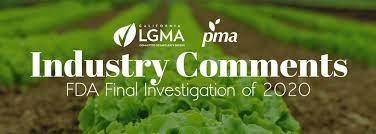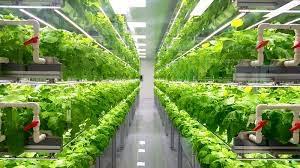Is the FDA Sidestepping the Health Implications of of Irrigated Produce?
|
12/12/2021 |
|
 Forced to confront widespread annual outbreaks of foodborne infection associated with leafy greens grown in the Yuma Valley of Arizona and the Imperial Valley of California, the FDA mandated regular assay of irrigation water for the presence of pathogens. These included E.coli O:157 and Salmonella derived from the runoff from CAFOs entering irrigation canals. Growers complained that the testing protocol was expensive and inconvenient. Forced to confront widespread annual outbreaks of foodborne infection associated with leafy greens grown in the Yuma Valley of Arizona and the Imperial Valley of California, the FDA mandated regular assay of irrigation water for the presence of pathogens. These included E.coli O:157 and Salmonella derived from the runoff from CAFOs entering irrigation canals. Growers complained that the testing protocol was expensive and inconvenient.
According to Frank Yiannas, Deputy Commissioner for Food Policy and Response of the FDA, the Agency will develop a new rule based on an annual assessment of risks with implementation of corrective action. The proposed rule will however require monitoring of irrigation water with appropriate mitigation in the event of contamination. Growers will be required to assess risks including potential for contamination by CAFOs, weather patterns, topography, and sunlight in a science-based assessment.
|

Vertical Farming |
The proposed FDA rule will not address the basic reality that CAFOs and irrigated green produce are spatially incompatible and the problem of contamination of irrigation water cannot be simply eliminated by the frequency of testing. Since the FDA was assigned the responsibility of implementing the Food Safety Modernization Act of 2011, leafy greens producers are now eleven years beyond the intended date of action with every likelihood of repeated outbreaks attributed to field-cultivated leafy greens.
|
|
It is inevitable that more vertical farming using advanced technology including hydroponics will become a greater contributor to national demand. The potential premium for produce devoid of contamination with pesticides and pathogens will offset higher initial capital investment. Advantages of alternatives to row cropping include enhanced sustainability, year-round cultivation and the potential for mechanization and robotics saving labor.
|

|
|
|